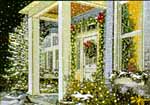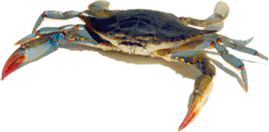
GHOTES
HOG ISLAND CHRISTMAS
an excerpt from Yesterday's Hog
Island
by Edna M. Marstad
Norfolk/Virginia Beach: The Donning Company Publishers
(c) 1985 Edna M. Marstad
Christmas on the Island
Christmas was always a festive holiday for the islanders; the women spent days making cookies shaped like Santa Claus, with cherry icing to depict his red attire and white sugar to make imaginary whiskers. There were wreath-shaped cookies, colored in green and red, and some women even baked cookies that resembled reindeers. Of course the gingerbread men were favorites, and these were hung on the tree. For the men there were pies, filled with preserved berries from their own gardens and delectable figs pickled during the summer. The week before Christmas, a woman scarcely moved from her kitchen. Daily there was a fragrant and appetizing scent from the oven. Young children loitered at the table waiting to wipe clean the remaining ingredients, whirling their little fingers around the inside of the bowl.
Christmas trees were axed from the woodlands, and mostly it was the children who decorated the pine branches. Their ornaments were handmade by the islanders; gingerbread men, strings of paper dolls, and popcorn in long chains that laced the tips of the branches. There were shells from the beaches dipped in glue and hung with ribbons. Cones were gathered from the woods, and these were nestled between the limbs of the tree. Nothing was store-bought, except the striped candy canes, which were always eaten instantly when the tree was denuded of ornaments the second week of January. Even the trees were not discarded. The men pinched off the branches and severed the trunks into kindling for the fireplace. Each house had a fragrant pine scent as the fire roared in the winter months.
Christmas dinner was similar to the feast at Thanksgiving; a chicken was roasted for the gala holiday. Many a mother wished the bird had more legs, for the youngsters all preferred these pieces. It was usually the father and the eldest son who succeeded in their choice unless the family was larger and had two fowls prepared. The stuffing was a favorite with them with them all, so the wife always doubled the the portion, and with the added earthenware dish of dressing there was more than enough to satisfy the young and the old. The wishbone was given to the youngest child, and after it was cleaned and dried it was wrapped in silve paper that came from the father's tobacco pouch, and this too was hung on the Christmas tree.
(page 37)
More about Yesterday's Hog Island by Edna M. Marstad
Short history from America's Atlantic Isles by H. Robert Morrison and Christine Eckstrom Lee.
Story of a rescue that happened in 1893 near Hog Island
![]()
A map showing topography of Hog Island.
More mapping. From topozone.com
Return to the top of this page
Return to the GHOTES home page
10, 2004 (wls)
 >>> Advertise Here <<<
>>> Advertise Here <<<